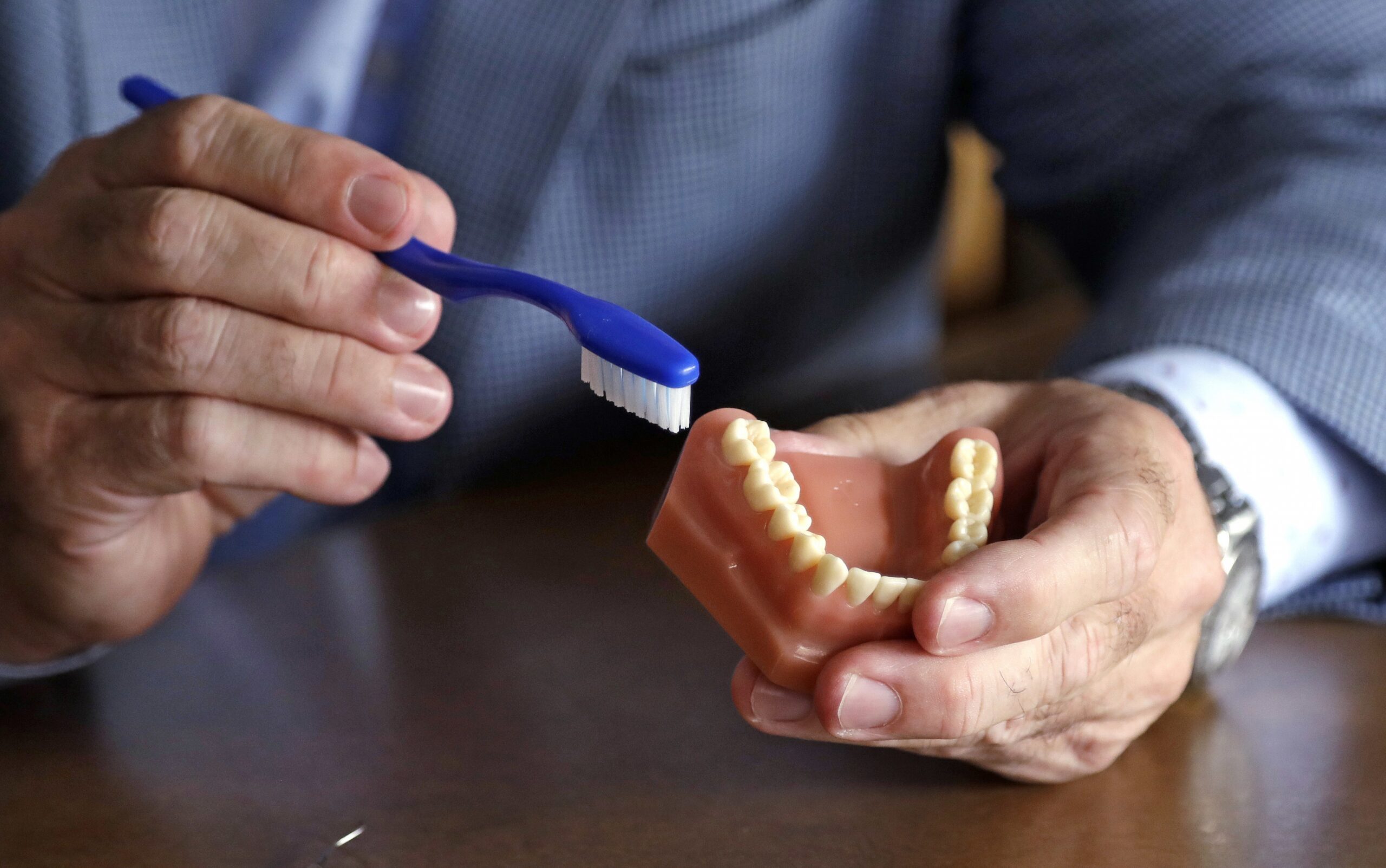In the last year, at least eleven Wisconsin communities have decided to stop adding fluoride to their public drinking water, concerned that possible health risks outweigh the benefits.
Community water fluoridation became widespread throughout the U.S. in the 1960s and is heralded by the Centers for Disease Control and Prevention as one of the 20th century’s greatest public health interventions.
Small amounts of fluoride in drinking water are proven to have widespread dental health benefits, including significantly reducing dental decay among the general population — especially children.
News with a little more humanity
WPR’s “Wisconsin Today” newsletter keeps you connected to the state you love without feeling overwhelmed. No paywall. No agenda. No corporate filter.
But in the last 20 years, there’s been a slow, downward trend in Wisconsin public water system fluoridation, according to data from the CDC. That decline has slightly accelerated in recent years.
At least four more Wisconsin communities — Black Earth, Ladysmith, Monroe and Wausau — are currently considering opting out of fluoridated water. Concerned citizens on both sides of the issue have been appearing at public hearings.
At a Wausau Water Works Commission meeting last month, Matthew Balgord expressed his distrust.
“We’ve had a lot of toxic chemicals in the past. We’ve had asbestos, tobacco, DDT, glyphosate, mercury, lead, J&J talcum powders — there’s lots of them,” Balgord said. “We don’t want to go through all that again.”
WPR’s “Wisconsin Today” asked a public health researcher and a dentist what Wisconsinites should know about the health impacts of fluoride in drinking water.
Without fluoridated water, community dental health could suffer
Prior to widespread community water fluoridation in the United States, tooth decay and loss were common. In the 1950s, more than half of Americans aged 65 and older did not have any teeth.
Dr. Chris Hansen is a recently retired dentist from Manitowoc County and the immediate past president of the Wisconsin Dental Association. He said not adding fluoride to public drinking water could have significant consequences.
“It could revert us back to an era where decay was more difficult to manage, and would really increase the public health burden,” Hansen said.
Hansen witnessed the consequences of the pre-fluoride era firsthand. He said it’s what inspired him to become a dentist.
“I saw the suffering that my father went through because of dental disease and dental decay issues. I remember him going to the dentist and having all his teeth removed and having a denture placed, and how he suffered with that,” Hansen said. “He grew up in an era where they did not have access to fluoridation.”
Some communities who previously discontinued the use of fluoride reversed their decision when they witnessed the consequences.
Antigo was one of the first Wisconsin communities to introduce fluoride to their water in 1949, but stopped after receiving pushback from worried citizens. Four years later, citizens voted to reintroduce fluoride to their drinking water after seeing increased rates of dental decay among children.

Fluoride can be harmful — at higher doses
Continued overexposure to fluoride can cause health problems, including staining teeth and a metabolic bone disease called skeletal fluorosis. More recently, opponents of water fluoridation have expressed concern over the possible neurotoxic effects of fluoride exposure.
Dr. Patrick Remington is an emeritus professor in the Department of Population Health Sciences at the UW School of Medicine and Public Health. He said that, like any other chemical, fluoride can be toxic at high doses.
“That’s why the recommendation for water fluoridation is quite low,” Remington said. “In fact, in the last decade or so, that level has dropped from 1.2 mg/L to 0.7 mg/L, because people get fluoride in other ways, like fluoridated toothpaste.”
This year, a report from the National Toxicology Program found that fluoride exposure of 1.5 mg/L or more is associated with lower IQ in children. The report notes that the data does not indicate a cause-and-effect relationship between fluoride and lower IQ — it merely suggests further study. There was not enough data to suggest that the current recommendation of 0.7 mg/L has any negative effect on children’s IQ.
“At the low levels that are seen in water supplementation, there is no firm evidence of any neurotoxic effects,” Remington said. “We rely on our environmental specialists in communities to make sure that the [fluoride] level is within the recommended range.”
To learn about your community’s water fluoridation level, visit the CDC’s My Water’s Fluoride page, or contact your local water utility.
Fluoridating drinking water is especially beneficial to those without dental care
“Water fluoridation is considered a classic public health intervention: We try to make the healthy choice the easy choice, or the default choice,” Remington said. “But with water fluoridation, individuals don’t have to choose at all.”
Some opponents to fluoridation have issues with the lack of choice — what they consider a breach of medical autonomy.
But Remington said that without community water fluoridation, the responsibility to maintain healthy teeth — through cleaning, supplements, sealants and other treatments — is between the individual and their dentist. And many people simply can’t afford dental care.
“Many dentists don’t accept Medicaid as a payer and so it’s really challenging, if you’re poor, to see a dentist,” Remington said. “[Finding] a dentist … to provide the right amount of fluoride can be challenging for people who are struggling with poverty.”

Fluoride toothpaste helps, but it’s usually not enough on its own
Fluoride toothpaste is now widely available and provides significant protection against tooth decay. However, Hansen says it’s not enough to warrant discontinuing fluoride from public drinking water.
“Water fluoridation helps with supplementing that shot of fluoride that you get from brushing, either with a gel or with a toothpaste, or a [fluoride] rinse,” Hansen said. “But that goes away pretty quickly. Having access to the low levels of fluoridation within the water really helps to supplement that.”
If a young patient gets their water from a water supply with low fluoride levels, like a well, Hansen says he usually prescribes a fluoride supplement in the form of drops or tablets.
Editor’s note: This story was updated to reflect that two communities who were previously considering opting out of community water fluoridation — the village of Biron and the city of Peshtigo — have already voted to do so.
Wisconsin Public Radio, © Copyright 2025, Board of Regents of the University of Wisconsin System and Wisconsin Educational Communications Board.





